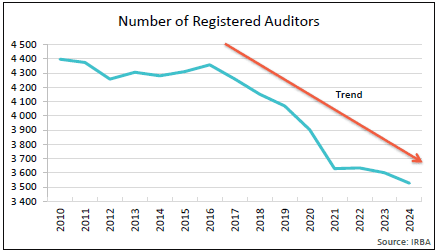Regulation and oversight in accounting – balancing fairness, stability and economic growth
Regulation and oversight increase the level of certainty essential for fairness and stability, particularly in the accounting profession. Clearly defined regulations prevent malfeasance, fraud, corruption, and injustice. The costs of increased regulation, and whether these exceed estimated benefits, is an issue that requires some evaluation.
With respect to the effectiveness of additional regulation in the accounting industry, additional regulation does not always assist in achieving the desired outcome. While there has always been a fair amount of regulation in the accounting industry, some scandals became public as far back as 2001, leading to Arthur Andersen’s demise related to the Enron scandal. A raft of additional regulation followed.
Twenty years later in South Africa, there were several breaches of regulations by big accounting firms in the private and public sector spaces. They suffered reputational damage and some lost clients and had to reduce staff. In the private sector sphere, as in the case of Steinhoff and VBS, shareholders and depositors who invested in those companies, took losses. In the public sector as in Eskom, taxpayers are carrying the can while they did not choose to invest in the company. This is further elaborated on in the Who Owns Whom report on the accounting industry in South Africa.
Public vs private sector accountability
There is a discrepancy between the consequences faced by private and public sector operators for being caught for wrongdoing. Every year, the Auditor-General (A-G) flags a litany of fraud and corruption in public sector entities. Were those irregularities committed by listed private sector companies, the consequence would be dire and they would face delisting or sanctions. This is not the case in the public sector.
Enhanced powers of the Auditor General
It was encouraging that the A-G’s powers were enhanced by the Public Audit Amendment Act (PAAA) which came into effect in 2019. This legislation allows the AGSA to issue debt recovery orders to recover financial losses due to misconduct, refer material irregularities to law enforcement agencies and fine auditors found guilty of transgressions up to R25m. This has strengthened audit quality and integrity in the accounting industry.
Government has all the tools in terms of regulations required to enforce corrective actions.
The importance of trust contributes to economic growth
The role of auditors is so important because they confirm that financial information can be trusted as accurate and correct, which is the foundation for decisions to invest in companies.
A study by Standard Bank found a collation between the decline in trust in the rule of law and slower economic growth, as businesses are reluctant to invest capital to expand their operations over the long term when they lack confidence in the regulatory framework. It stated that the rule of law is vital for a modern economy to prosper, and declining trust could prove fatal for economic growth.
Public Trust and economic performance indicators
Addressing the skills gap in Accounting
The accounting profession is operating in a continuously changing environment due to additional regulation that is challenging and demanding, a situation that is not helped by the growing skills gap as illustrated in this graph.

Because of the important role of auditors in instilling public confidence and trust in their findings, it would be advisable to facilitate career orientation towards this profession.
The future of the accounting industry in South Africa
As indicated in the Who Owns Whom report on the accounting industry in South Africa, the use of digital tools and technologies such as cloud-based accounting software, AI-driven analytics, and blockchain technology, is improving efficiency and providing insights for strategic decision-making.
South African firms increasingly use digital tools to automate financial data processing, lower operating costs and automate risk assessment and data analysis for greater productivity and efficiency. Blockchain technology is becoming a useful accounting tool for securely integrating financial and non-financial information.
The future of accounting in South Africa depends on the balance between regulatory efficiency, innovation, and growing the skills base of accounting professionals.
Contact us to access WOW's quality research on African industries and business
Contact UsRelated Articles
BlogCountries Administrative and support activitiesSouth Africa
State-owned enterprises in South Africa – a sword of Damocles for the fiscus
Contents [hide] As articulated in the Who Owns Whom report on South Africa’s SOEs , the major SOEs’ total asset value (financial and non-financial) rose by 2.1 % to R1.65...
BlogCountries Administrative and support activitiesSouth Africa
Exploring the travel and tourism industry in South Africa
Contents [hide] As traditional tourist destinations face numerous challenges such as over-tourism, environmental impacts, economic instability, rising inflation and a high cost of living, South Africa is in a good...
BlogCountries Administrative and support activitiesMozambiqueTransportation and storage
Boosting Mozambique’s Tourism Through Sustainable Practices
Contents [hide] All countries want inbound tourism, which contributes to GDP. In Mozambique, tourism accounted for 3.71% of GDP between 2016 and 2020 when it welcomed an average of 2...





